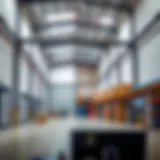Exploring DIFC Coworking Spaces: A Comprehensive Guide


Intro
As the professional landscape continues to shift, coworking spaces have redefined how we perceive and utilize work environments. This transformation is especially pronounced in prime locations such as the Dubai International Financial Centre (DIFC), where modernity meets tradition, resulting in a unique work atmosphere. In this vibrant melting pot, DIFC coworking spaces offer more than just a desk; they provide a community and a hub for innovation.
DIFC stands out not just for its geographical location but also for its strategic importance in the global business map. With the changing tides of the workforce, there’s an increasing demand for flexible and collaborative workspaces. This article provides a closer look at the compelling benefits and distinctive features that these spaces bring to the table, particularly for investors, property agents, and expatriates alike. By understanding the nuances of this sector, we can better navigate the opportunities DIFC presents.
In the following sections, we will explore current market insights, investment strategies, and practical considerations that enrich the experience of working or investing in these coworking environments. Let’s dive deeper into what makes DIFC a unique hotspot in the evolving landscape of coworking spaces.
Overview of DIFC
The Dubai International Financial Centre (DIFC) stands as a beacon of modern business practices, integrating the essence of both local culture and global sophistication. It plays a crucial role in the professional landscape of Dubai, serving not just as a financial hub, but also as a melting pot for innovation and collaboration. The significance of exploring DIFC in the context of coworking spaces cannot be overstated, especially for real estate investors, property agents, analysts, and expatriates seeking opportunities in a vibrant and competitive market.
Historical Context
DIFC’s journey began in 2004, aiming to create a financial district that would attract international businesses and foster economic growth. Initially, it was envisioned to house financial institutions, but over the years, it has cultivated a diverse range of sectors. The architecture of the place reflects its ambition, with modern skyscrapers enveloping the area, each telling a story of aspiration and growth.
Interestingly, over time, DIFC has transformed into a nucleus for startups and entrepreneurs, embodying a spirit of innovation. Coworking spaces have popped up like mushrooms, catering to a new workforce that values flexibility and connectivity. This historical backdrop is essential to appreciate the evolution of coworking in DIFC — it’s not just about shared spaces, it’s about a shared vision that has flourished since its inception.
Economic Significance
The economic significance of DIFC extends well beyond its borders. As a free zone, it offers a plethora of benefits, such as full ownership, tax exemptions, and legal autonomy. This captivating environment has lured numerous multinational companies and startups alike, laying down the foundations for a booming economy.
“DIFC is not merely a financial centre; it’s a catalyst for innovation in the Middle East.”
As businesses are drawn to the financial incentives and the thriving community, coworking spaces have become pivotal in fostering relationships and collaborations. Investors looking to capitalize on these advantages find DIFC appealing, as it provides a unique blend of opportunities, infrastructure, and access to a global talent pool. Coworking spaces in this area act almost like a stage where diverse actors come together to create new narratives in business.
As the world adapts to new work regulations and hybrid models, the significance of the DIFC in the larger economic fabric cannot be overlooked. It is a testament to how one area can shape a city’s fate through strategic planning and inclusive growth, presenting an attractive option not just for businesses, but for individuals ready to set sail on new professional adventures.
Understanding Coworking Spaces
The concept of coworking spaces transcends mere office leases. They're environments that foster collaboration, creativity, and community. In DIFC, the very heart of Dubai's financial landscape, coworking offers a unique blend of professionalism coupled with accessibility. For investors and prospective users alike, grasping the intricacies of coworking spaces unveils significant benefits and considerations. This understanding is crucial, not just to optimize workplace experiences, but also for strategic real estate investments.
Definition and Characteristics
Coworking spaces can be defined as shared working environments that encompass a diverse group of individuals from various industries. Unlike traditional offices, these spaces promote an atmosphere of collaboration, where freelancers, startups, and established companies share resources and ideas.
Key characteristics of coworking spaces typically include:
- Flexibility: Many coworking setups offer adjustable membership plans, catering to both short-term and long-term needs. This flexibility is ideal for both startups and established professionals seeking temporary solutions.
- Community Engagement: The essence of coworking lies in its community spirit. Regular networking events, workshops, and social gatherings are often organized, encouraging users to connect and collaborate.
- Shared Amenities: Facilities such as high-speed internet, conference rooms, and communal areas are typically provided, making it easier for members to focus on their work without the overhead costs of traditional office spaces.
- Creative Environment: The design of coworking spaces often breaks away from the mundane. Expect artistic decor that promotes innovation and creativity.
Understanding these characteristics gives potential users insight into how they can leverage these environments to their advantage, often leading to enhanced productivity and networking.
Evolving Trends in Workspaces
The modern workspace is not just about having a physical location. It is evolving constantly, shaped by social dynamics and technological advancements. One trend that stands out in the realm of coworking is the move towards hybrid work arrangements. This approach blends remote and in-office work, allowing professionals the freedom to choose how and where they work best.
Moreover, with the increase in digital nomadism, coworking spaces are adapting. They are now designed to support a mobile workforce, offering adaptable workstations and facilities that cater to on-the-go professionals.
Many coworking spaces now incorporate elements such as:
- Sustainability Initiatives: With an ever-growing emphasis on environmental responsibility, many spaces prioritize eco-friendly designs and practices, like reducing energy consumption and utilizing recycled materials.
- Health and Wellness Programs: The pandemic has heightened the focus on mental health, leading to more spaces incorporating wellness programs, meditation rooms, and ergonomic furniture to foster a more holistic work environment.
- Technology Enhancement: The integration of advanced technologies, such as artificial intelligence for administrative tasks and virtual reality for meetings, enhances the overall experience of coworking users.
Staying abreast of these evolving trends helps investors, agents, and expatriates make informed decisions about their workspace choices in DIFC and beyond.
The coworking model is not just a trend; it's a shift in how we perceive workspaces, making collaboration and community essential components in today's professional environment.
Benefits of Coworking in DIFC
Coworking spaces in the Dubai International Financial Centre (DIFC) represent more than just a place to work; they offer a multitude of benefits that can enhance the productivity, networking, and overall experience of their users. With an array of advantages, these spaces meet the demands of a dynamic workforce and contribute significantly to the burgeoning business landscape in Dubai. Let’s delve into three compelling benefits: networking opportunities, flexibility and cost-effectiveness, and access to professional resources.
Networking Opportunities


One of the standout features of DIFC coworking spaces is the networking potential they present. Here, you are not just sharing a desk; you’re sharing ideas, insights, and experiences with a diverse mix of professionals – from tech startups to finance moguls. Being part of such a vibrant community can spark collaborations that you may not find in the conventional office setup.
The proximity to various businesses offers a myriad of chances to connect with industry leaders, potential partners, and like-minded individuals. Coworkers often share leads, advice, and even client contacts, fostering an atmosphere of mutual support. For instance, an entrepreneur in a tech startup might find invaluable advice from an established consultant sitting next to them. Conversations often flow naturally over coffee breaks or lunch, where ideas get thrown around and partnerships begin to bloom.
"Networking in a coworking environment can lead to opportunities that might otherwise be missed in traditional settings. It's not just about who you know, but who you could meet!"
Flexibility and Cost-Effectiveness
Coworking spaces offer an appealing flexibility that traditional office setups struggle to match. For businesses that are just starting out or even those experimenting with new ideas, the financial commitment of a long lease can be a heavy burden. The pay-as-you-go model found in various DIFC coworking spots allows businesses to scale up or down based on their current needs without worrying about being tied to a lease for years.
Furthermore, the variety of membership options—whether it’s hot-desking, dedicated desks, or private offices—caters to different organizational needs. This kind of flexibility is particularly attractive for freelancers or startups that require low overhead costs without sacrificing a professional environment.
Benefits of this flexibility include:
- Lower upfront costs: Reducing the financial strain of starting a business.
- No long-term commitments: Adapting spaces as your business needs evolve.
- Work-life balance: Offering the choice to work remotely without losing the benefits of a professional address.
Access to Professional Resources
Coworking spaces in DIFC are designed to be hubs of productivity, providing users with access to a range of professional resources. This includes high-speed internet, ergonomic furniture, meeting rooms equipped with state-of-the-art technology, and access to printing services. These amenities are crucial for those who might not have the budget for a full office setup, allowing them to operate as if they have a dedicated office.
In addition, many of these spaces host workshops, seminars, and networking events that provide users with development opportunities. Learning from industry experts can propel a business forward and help individuals stay abreast of market trends and innovations. Such curated experiences create an ecosystem where knowledge-sharing is paramount.
In summary, coworking in DIFC is not just about the workspace. It’s about building connections, enjoying adaptability, and tapping into a wealth of resources that can enhance both personal and professional growth. With these benefits, it’s no wonder that so many individuals and companies are embracing this modern way of working.
Key Features of DIFC Coworking Spaces
Coworking spaces have transformed how businesses, freelancers, and entrepreneurs operate, particularly within the bustling environment of Dubai International Financial Centre (DIFC). Understanding the key features of these spaces is crucial for investors, property agents, and professionals looking to make informed decisions in this competitive landscape. Here, we delve into what makes DIFC coworking spaces stand out, focusing on their design, technology integration, and the wide range of amenities offered.
Design and Infrastructure
The architectural vision of DIFC coworking spaces reflects a blend of functionality and modern aesthetics. It’s not just about having a roof over your head; these spaces are crafted with meticulous attention to detail. Natural light floods through expansive glass walls, creating an inviting atmosphere that can boost creativity and productivity. The layout often incorporates open-plan areas, alongside quieter nooks for focused work, catering to various working styles.
Moreover, the infrastructure supports both individual and collaborative efforts. Flexibility is key, as many companies, especially startups, might require different configurations throughout their lifecycle. The ability to easily adjust workspace layouts allows firms to scale efficiently, aligning with their needs without incurring excessive costs.
"The design and infrastructure of coworking spaces in DIFC are as dynamic as the businesses they house, fostering innovation and collaboration through thoughtful architecture."
Technology Integration
In today’s fast-paced digital age, technology isn’t just an accessory; it’s the backbone of effective coworking environments. High-speed internet is standard across all DIFC coworking spaces, enabling seamless connectivity for remote work and online communication. Furthermore, many of these spaces are equipped with smart technology that enhances the user experience—think automated lighting systems and climate control that adjusts based on usage patterns.
Meeting rooms often feature advanced audiovisual equipment. Video conferencing tools allow businesses to connect easily with clients and partners around the globe. Additionally, secure cloud storage solutions ensure that sensitive data remains protected while providing easy access for authorized users. This tech-centric approach allows individuals and companies to operate as if they were in their own offices, making the transition smoother and more efficient.
Amenities and Services Offered
Besides the physical aspects, DIFC coworking spaces also excel in offering an array of amenities and services that cater to the modern professional. On-site cafes and lounges provide much-needed breaks and informal meeting spots, while other facilities like gyms or wellness rooms support a healthy work-life balance, essential in high-stress environments.
Furthermore, many coworking spaces feature business support services like administrative assistance, mail handling, and event hosting capabilities. This variety allows professionals to focus on their core activities without worrying about the logistical challenges often associated with managing a workspace.
In summary, the key features of DIFC coworking spaces—ranging from innovative design and solid infrastructure to cutting-edge technology and indispensable amenities—form a comprehensive ecosystem that adapts to the modern workforce's evolving needs. Such spaces not only enhance day-to-day productivity but also foster a vibrant community of like-minded individuals and enterprises.
The Ideal User for DIFC Coworking Spaces
Understanding who benefits most from coworking spaces in the DIFC is crucial. The dynamics of the workforce are changing rapidly. The rise of freelancing and remote work has created a diverse pool of users seeking flexible environments that encourage productivity, creativity, and networking opportunities. DIFC coworking spaces are designed with this evolving landscape in mind, catering to various professional needs and aspirations.
Target Demographics
The target user base for coworking spaces in DIFC is quite broad, yet it can be distilled into a few key demographics. These include:
- Freelancers and Contractors: Individuals who provide specialized services often thrive in the collaborative atmosphere of coworking spaces. They are typically looking for environments that foster creativity without the constraints of traditional office settings.
- Small and Medium Enterprises (SMEs): Many startups and SMEs prefer flexible workspace arrangements, allowing them to scale up or down as needed. Coworking spaces offer the ability to expand without the long-term commitment of leasing conventional office space.
- Corporate Professionals: Larger enterprises are increasingly setting up remote teams and utilizing coworking spaces as satellite offices. This arrangement supports their workforce in staying connected to the heart of the business district while optimizing costs.
- Tech Startups: The tech industry is synonymous with innovation. Tech startups flock to coworking spaces to harness shared resources like high-speed internet and collaborative tools that drive the next big idea.
This diverse demographic is reflected in the offerings of DIFC coworking spaces, which typically include various memberships and amenities tailored to meet the distinct needs of each group.


Professionals and Startups
Professionals and startups represent a significant portion of the ideal user base in DIFC coworking spaces. The characteristics of these groups highlight the importance of a cooperative workspace in today's economy.
For professionals, the coworking environment presents a prime opportunity for networking. Unlike a conventional office setting, where interactions might be limited to own team members, coworking spaces in DIFC bring together a mosaic of talent from different sectors. For instance, a marketing consultant could sit next to a software developer, leading to potential partnerships. Moreover, the appeal of being surrounded by like-minded individuals fosters motivation and productivity.
Startups in particular occupy a unique niche. Often pressed for time and resources, these businesses benefit from the infrastructure provided by coworking spaces. They can access meeting rooms, equipment, and high-speed internet without the financial burden of establishing a standalone office. Importantly, this also allows them to focus on their core business activities and growth rather than getting bogged down by administrative tasks.
Key Considerations for Professionals and Startups:
- Networking Opportunities: Engaging with a diverse group of professionals can lead to collaborations that might not happen otherwise.
- Affordability: Shared resources and amenities keep costs manageable, a consideration particularly critical for startups.
- Flexibility: The ability to scale up or down is essential for professionals, especially in fast-moving industries.
In summary, the ideal users of DIFC coworking spaces are diverse, including freelance professionals, tech startups, and larger corporations seeking dynamic work environments. Each group finds its own unique value in the flexible, collaborative setup of these spaces, solidifying their place in the modern working ecosystem.
Comparison with Other Coworking Spaces
When assessing coworking spaces, it’s vital to make a well-informed comparison with others in the market. The uniqueness of DIFC coworking spaces lies not only in their prime location but also in the multifaceted environment they provide. For investors and individuals exploring options, understanding these comparisons can illuminate strategic decisions, whether it’s about budgeting or optimizing workspace needs.
Local Competitors
In the bustling heart of Dubai, you’ll find a variety of coworking spaces clamoring for attention. Understanding the local competitors is essential for gauging DIFC’s offerings. Key players include spaces like The Office and Common Ground. These alternatives provide varying degrees of flexibility, design, and amenities.
The Office offers modernity with a focus on vibrant community activities; it features an extensive networking calendar to foster relationships among professionals.
Conversely, Common Ground emphasizes a more tranquil atmosphere, catering to startups that demand quieter settings while retaining crucial connections via community events. Here are some notable features of these local competitors:
- Location: Proximity to public transport and other amenities.
- Price ranges: Competitive pricing models that may vary significantly.
- Networking events: Regular workshops and social meet-ups to connect professionals.
- Flexibility: Options for long-term leases versus hot desks or pay-per-use.
Recognizing these nuances in local offerings can help potential users assess where DIFC coworking spaces might fulfill specific needs better than their competitors.
International Comparisons
Looking beyond local competitors, it’s insightful to compare DIFC coworking spaces with international peers like WeWork and Spaces. These global entities provide extensive franchise models, making them familiar options worldwide, yet, DIFC spaces bring some unique flavors to the table.
Global Perspective
- WeWork boasts a massive presence across the globe, providing innovative work environments that vary from vibrant to cool and minimalist. They integrate global network opportunities for members which might appeal to expatriates seeking international exposure.
- Spaces, on the other hand, captures the essence of creative working communities, often featuring artistic decor and relaxing break zones. This approach promotes collaboration among diverse professionals.
DIFC, comprising high-quality interiors, exceptional architecture, and an emphasis on financial services, offers targeted amenities that resonate with professionals in finance, law, and technology. Some factors that distinguish DIFC include:
- Regulatory Framework: The DIFC operates under its jurisdiction, making it easier for businesses focused on financial operations and compliance.
- Tailored Amenities: Unlike broader spaces, DIFC coworking spots often provide niche services like trading rooms or legal consultation rooms.
- Cultural Context: A focus on the cultural and financial dynamics of the region adds a layer of depth in comparison to more generalized international spaces.
Understanding the comparisons helps in deciding if the benefits of coworking in DIFC align with the specific demands of professionals and startups moving in or within this vibrant city.
As we navigate the complexities of coworking options in the DIFC area, these comparisons serve to illuminate the unique threshold that differentiates the space from others, enabling informed choices for potential users in their professional journeys.
Challenges of Coworking in DIFC
Coworking spaces have become increasingly popular in the DIFC, but they come with their own set of challenges. Understanding these hurdles is crucial for anyone looking to invest, operate, or utilize these spaces. It’s not just about the benefits; awareness of potential pitfalls can shape better decision-making. The complexities involved can affect dynamics between businesses and individuals alike.
Cultural Considerations
Cultural understanding is a fundamental component in the landscape of coworking in the DIFC. The clientele here is diverse, stemming from various backgrounds and cultures. Each group brings its own set of values, practices, and communication styles, which can sometimes clash. For instance, someone from a more relaxed culture may find it difficult to adapt to the fast-paced, high-stakes environment that DIFC represents.
A deeper appreciation for local customs and business etiquette becomes imperative. Coworking spaces often host international professionals who may not be fully cognizant of local business norms. This can lead to misunderstandings or even discomfort among users. Additionally, some expatriates may find it challenging to integrate into the local community, which can undermine the collaborative spirit that coworking spaces typically promote.
"A successful coworking environment thrives on the fusion of varied cultural perspectives. Recognizing and respecting these differences is key to fostering inclusivity."
To navigate these cultural considerations effectively, coworking spaces can implement cultural training programs or workshops. These initiatives can not only equip members with valuable insights but also encourage a sense of belonging. This would help create a more cohesive environment while simultaneously retaining the unique qualities each individual brings.
Economic Dependencies


Economic dependencies introduce another layer of complexity for coworking spaces in DIFC. The financial landscape of Dubai is ever-changing and holds different implications for coworking hubs. As various sectors fluctuate, coworking spaces may find themselves affected by influences beyond their control, such as economic downturns or rapid market fluctuations.
For instance, those reliant on a specific sector—like finance or tech—may see surges or drops in demand based on the greater economic context. If a major financial shift occurs, coworking spaces aimed at finance professionals may have to rethink their strategies, pivoting toward other industries to maintain occupancy levels.
Additionally, reliance on local businesses can create vulnerabilities. If a number of tenants within the coworking space are unable to sustain their operations, it directly impacts the coworking brand itself. Community dynamics can shift, leading to a decrease in collaboration and support that are central to the coworking ethos.
To mitigate these risks, coworking spaces could benefit from diversifying their target markets. By attracting professionals from various fields, they can create a robust ecosystem that is less susceptible to the whims of a single industry. This approach not only strengthens their market position but also offers members a richer array of networking opportunities.
Future of Coworking in DIFC
The landscape of coworking spaces in Dubai International Financial Centre (DIFC) is ever-evolving. As work habits shift and technology advances, understanding the future of these collaborative environments becomes crucial. The relevance of this topic boils down to the fact that coworking spaces are not merely a place to punch the clock. They are a reflection of modern work culture and business agility. Investors, real estate agents, and entrepreneurs must stay ahead and adapt to these trends to thrive in a competitive market.
Emerging Trends
As we peer into the horizon, several emerging trends signal what’s next for coworking in DIFC. Firstly, sustainability is no longer just a buzzword; it’s becoming a cornerstone for new coworking designs. Spaces that minimize their ecological footprint through energy-efficient technologies and environmentally friendly materials are gaining precedence. A focus on biophilic design—incorporating natural elements into workspace—can improve well-being and productivity, becoming a winning formula.
Moreover, companies are increasingly leaning on flexibility. More than ever, businesses are searching for spaces that offer varying configurations—like hot desks, private offices, and meeting rooms that can be adjusted as needed. This versatility caters to startups and established firms alike who seek lower overheads without sacrificing professional environments.
Lastly, tech integration is anticipated to soar. The marriage of artificial intelligence with coworking operations could personalize user experiences—think smart workstations that adapt to the user’s preferences. The goal here is to boost efficiency, make daily operations smoother, and create an immersive workspace feel.
Projected Developments
When it comes to projected developments, various factors will likely shape the coworking narratives in DIFC. One key element is the trend of remote work continuing to flourish post-pandemic. More companies may adopt hybrid models, emphasizing the need for collaborative workspaces while allowing employees some flexibility to work from home. Coworking paths could diverge into niche spaces catering specifically to certain sectors, like tech or finance, providing tailored environments that foster innovation.
Expanding on this niche focus, DIFC might see the rise of wellness-centric coworking spaces. These special environments could offer more than just desks and Wi-Fi; think fitness classes, meditation rooms, and ergonomic furniture designed to enhance physical well-being. A healthy mind and body can lead to greater productivity and employee satisfaction.
Furthermore, as businesses begin to understand the value of coworking and its role in fostering a vibrant community, we can expect a growth in partnerships between coworking spaces and local organizations or universities. Programs that encourage up-and-coming entrepreneurs or host networking events could establish a strong community link, which in turn, could attract more talent into the area.
In summary, the future of coworking in DIFC shines with opportunity. By recognizing and adapting to these emerging trends and predicted developments, stakeholders can not only navigate through the currents of change but also harness them to create thriving futures.
Investment Potential in DIFC Coworking Spaces
Investment in coworking spaces within the Dubai International Financial Centre (DIFC) represents a growing opportunity for savvy investors, real estate agents, and industry analysts. With the rise of remote work and the dynamic shift in the corporate landscape, DIFC's coworking environments have not just evolved; they are leading the way in modern workspace solutions. The importance of understanding the investment potential in these spaces cannot be overstated, especially considering the distinctive features, economic environment, and the professional community that DIFC nurtures.
Market Analysis
The market landscape for coworking spaces in DIFC is robust and promising. Leading global firms and startups alike are increasingly turning to flexible workspace solutions, making DIFC a hotbed for coworking innovation. Several factors are influencing this trend:
- High Demand: The appeal of a centrally located, vibrant ecosystem attracts a diverse clientele, from freelancers to multinational companies. The demand has surged over the past few years, exacerbated by the increasing popularity of remote working arrangements.
- Diverse User Base: Whether it’s a burgeoning tech startup or a seasoned financial firm, DIFC provides an attractive proposition. Coworking spaces cater to various sizes, industries, and professional backgrounds, enhancing the possibilities for collaboration and networking.
- Flexibility and Scalability: Investors enjoy the flexibility associated with coworking spaces. It’s possible to scale operations up or down in alignment with market demands, something that traditional office space often lacks. This adaptability is particularly appealing in uncertain economic times.
- Access to Quality Amenities: DIFC coworking spaces are known for their top-notch facilities, including advanced technological integrations, meeting rooms, and professional services. This contributes to the overall quality of offerings, making them highly sought after.
Understanding these dynamics can guide investors in identifying which coworking spaces may hold the most potential for future growth. For instance, analyzing occupancy rates, growth trends, and demographic shifts can help pinpoint promising investment opportunities.
Risk Assessment
Investing in coworking spaces, like any venture, comes wrapped in its own set of risks that must be weighed carefully:
- Market Volatility: While DIFC boasts a resilient economy, fluctuations in global markets can directly impact coworking space demand. Economic downturns can see businesses cut down on expenditures, impacting occupancy rates of coworking spaces.
- Competition: Coworking is a well-trodden path, and competition can be fierce. With local and international players vying for attention, new entrants must differentiate themselves clearly – a challenge that could impact profitability.
- Regulatory Changes: Navigating the regulatory landscape in Dubai is crucial. Sudden changes in policy regarding commercial leases or business operations can pose unforeseen challenges. For instance, how duty-free trade changes might affect international businesses based in DIFC could be a concern for investors to monitor.
- Cultural Dynamics: Understanding the cultural aspects of doing business in Dubai can also play a significant role. Misjudging local business etiquette or not adapting to the melting pot of DIFC could alienate valued clientele.
"Navigating the intricacies of investment in coworking spaces is much like sailing: understanding the winds of change can help you steer toward success."
In considering these factors, investors can adequately prepare and position themselves to thrive in the evolving coworking marketplace.
Culmination
The significance of the topic explored in this article lies in the profound changes that coworking spaces have brought to the business landscape of Dubai, specifically within the Dubai International Financial Centre (DIFC). Coworking spaces are more than just trendy places to work; they embody a shift in how professionals and businesses approach collaboration, productivity, and flexibility.
Summarizing Key Insights
As we look back on the comprehensive analysis of DIFC coworking spaces, several key insights stand out:
- Networking Advantages: The coworking environment nurtures organic connections among diverse professionals, leading to opportunities that can transform careers and nurture startups.
- Cost Effectiveness: Compared to traditional office spaces, coworking offers an economical option with flexible terms, making it easier for startups and freelancers to carve their niche without breaking the bank.
- Professional Support: Residents of DIFC coworking spaces often benefit from shared resources like high-speed internet, printing facilities, and meeting rooms, essential for efficient business operations.
These elements not only enhance individual productivity but also contribute significantly to the entrepreneurial ecosystem in Dubai.
Final Thoughts on the DIFC Space
In essence, the future of work is not just about finding a desk in an office; it's about becoming part of a community, a movement toward something bigger—a notion thoroughly embodied within DIFC's expansive range of coworking offerings.











